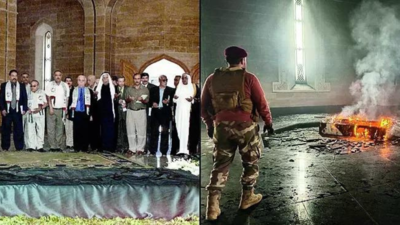
The rebels who are now Syria’s de facto rulers have started to make their mark on the country’s govt. They took control of Aleppo just two weeks ago, but already police officers are in the streets sporting new uniforms, administrators are busy in the halls of govt and there are posters on lampposts with QR codes directing people to updates on govt policy. Gone are the ubiquitous photos of ousted president Bashar al-Assad, whose visage, like that of his father before him, had dominated the city. The Assad regime controlled the country for decades, then crumbled in days. It has been replaced by rebel factions led by Hayat Tahrir al-Sham.
With all eyes on the rebels’ plans for the future, Aleppo offers early hints on how the group might approach governance – at least in the immediate future. The group is vowing to maintain security and continuity, aiming to avoid the kind of power vacuum that has followed other Arab revolutions or regime changes. Over the past week, there have been flashes of normalcy in the city, residents said, expressing some hope for the future. The rebels took over much of the city on Nov 27. After capturing Aleppo, the fighters moved on, leaving the city in the hands of its bureaucrats to preserve govt institutions, said HTS chief Abu Mohammad al-Jolani.
In Aleppo, new billboards have quickly appeared. On one, the new justice minister, Shadi Muhammad al-Waisi, proclaimed the era of oppression was over. Once Syria’s commercial hub, Aleppo’s factories and businesses were largely destroyed during the civil war. “Justice and equality are the rulers after today,” the billboard read. Another billboard featured the finance minister: “Be assured people of Aleppo,” the banner reads, “your property and your money are protected.”
On Monday in Aleppo, an administrator with the rebel group asked members of the city council if they were ready to continue to do their work. They all appeared willing.
In the immediate days after the rebels captured Aleppo, the city remained stunned and quiet. But within days, prices at shops, on public transportation and at the gas pump skyrocketed. The price of a minibus ride quadrupled from 1,000 Syrian pounds to 4,000, or about $1.60. But residents said some costs have levelled off, and though there were reports of theft, many said they were starting to feel more secure.
A resident of Sulaymaniyah, a Christian neighbourhood, said owners of liquor stores feared their stocks would be destroyed. But the rebels didn’t comes near the shops, he said. Christians account for about 5% of Syria’s population. On the day rebels captured Aleppo, some rebels reportedly went to homes in Christian neighbourhoods to reassure them of their safety, residents said. Analysts say rebels’ treatment of minorities could be a harbinger of how they will expand from their corner of the country to the rest of Syria.






